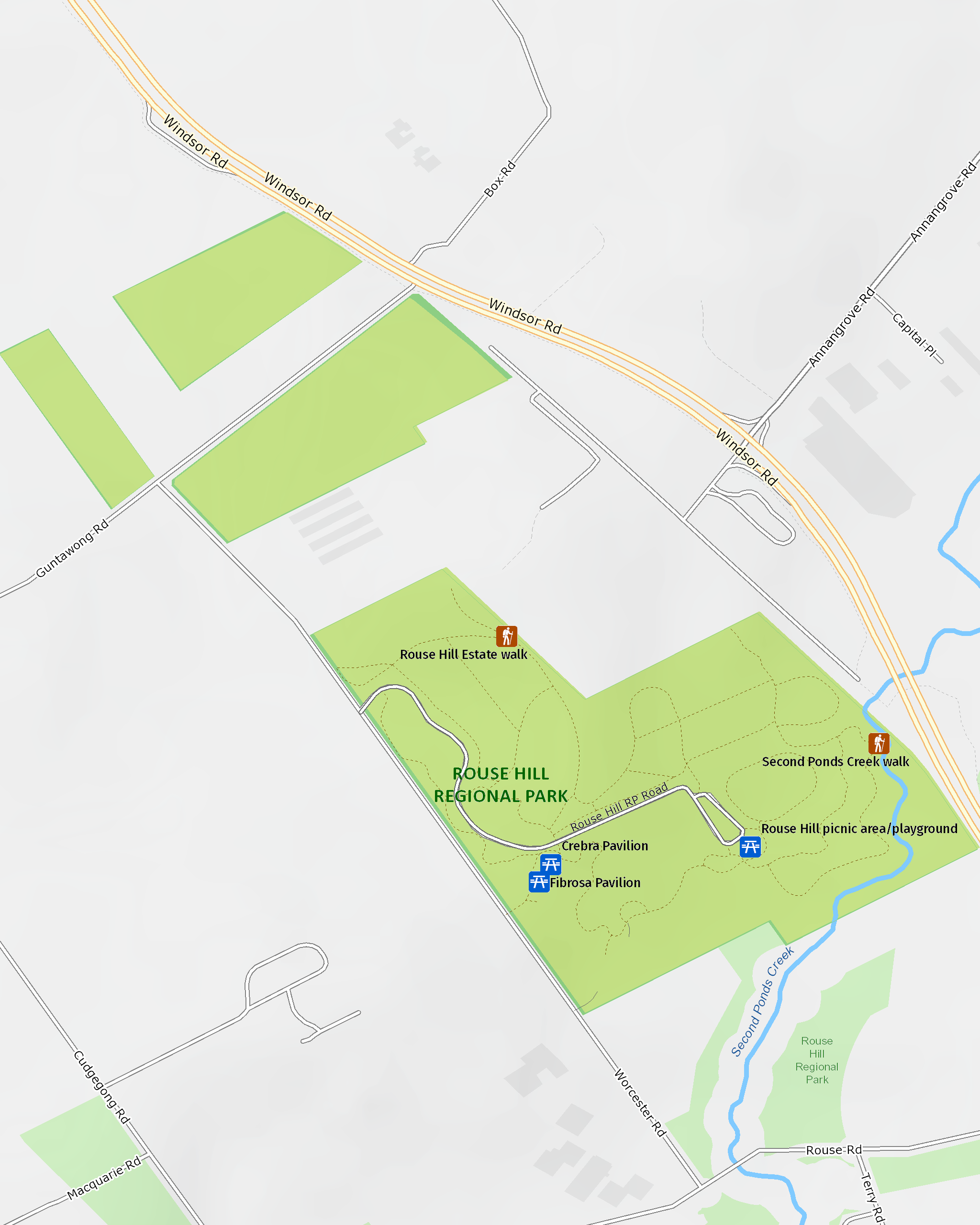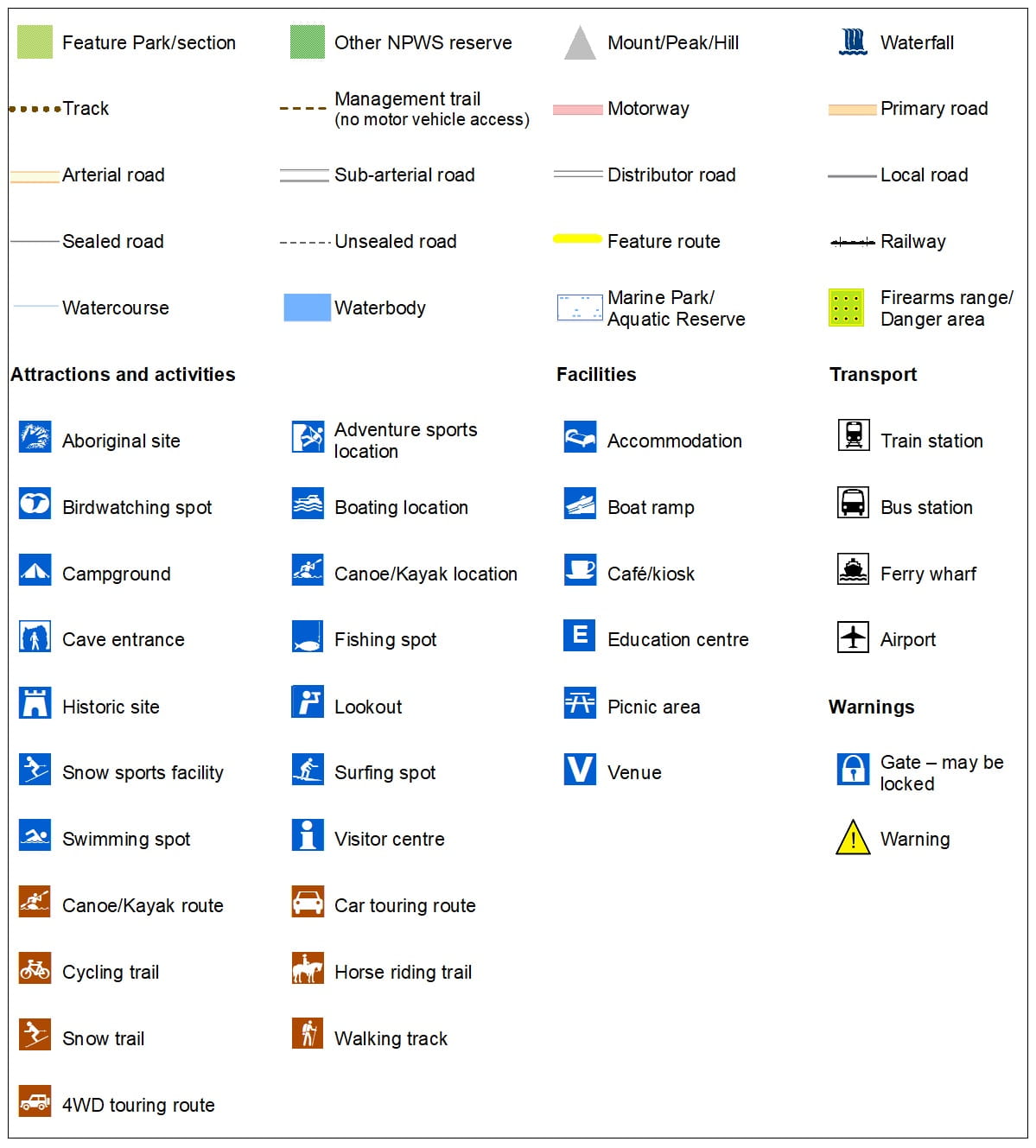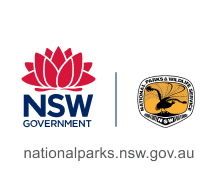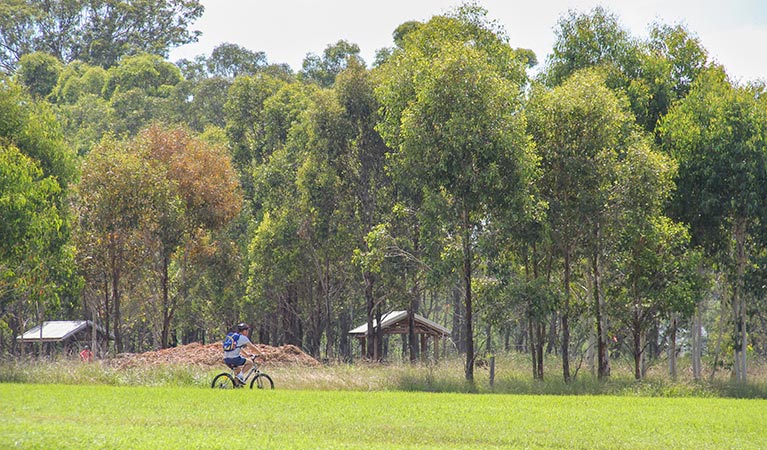Rouse Hill Regional Park
Overview
Dog-friendly Rouse Hill Regional Park is great for a picnic or barbecue. There is a lot to do; head to the playground, go bike riding, or take a stroll down to Second Ponds Creek.
Read more about Rouse Hill Regional Park
Rouse Hill Regional Park is a fabulous resource for Hills District locals and visitors alike. Hire the relaxed Crebra or Fibrosa Pavilions for a special occasion, take a family bike ride on the trails, organise a birthday picnic or just go for a rejuvenating walk.
Kids love the adventure playground and the tracks are great for riding scooters and bikes – it’s the perfect spot for a barbeque or picnic lunch with family and friends. You can even bring your dog along.
Local alerts
For the latest updates on fires, closures and other alerts in this area, see https://www.nationalparks.nsw.gov.au/visit-a-park/parks/rouse-hill-regional-park/local-alerts
Map

Map legend

Contact
- in the Sydney and surrounds region
Rouse Hill Regional Park is open 8am to 6pm from May to August and 8am to 8pm from September to April. The park may have to close at times due to poor weather or fire danger.
-
-
Scheyville office
02 4580 2750
Contact hours: Monday to Friday, 8.30am to 4.30pm. Closed public holidays. - 71 Memorial Drive, Scheyville 2756
-
Email: npws.cumberland@environment.nsw.gov.au
-
Scheyville office
Visitor info
All the practical information you need to know about Rouse Hill Regional Park.
Maps and downloads
Nearby towns
Rouse Hill (2 km)
Located north-west of the Sydney CBD in the Hills District, Rouse Hill is home to Rouse Hill Regional Park, where you can take your dog for a walk, enjoy a picnic with family and friends, and even hire an outdoor wedding venue.
Parramatta (21 km)
Parramatta offers a fascinating insight into early colonial life in Australia. Don't miss a visit to Old Government House, now one of 11 Australian Convict Sites on the UNESCO World Heritage list.
Sydney City Centre (44 km)
No trip to Sydney is complete without spending some time in the city’s beautiful parks. Whether it’s in central areas like Hyde Park or the Royal Botanic Gardens or further out in Centennial Parklands, there’s plenty of green space to go out and enjoy.
Learn more
Rouse Hill Regional Park is a special place. Here are just some of the reasons why:
Beautiful venue

If you're looking for a memorable location for your wedding or special event, think about hiring the Crebra or Fibrosa Pavilions. These fabulous open pavilions sit strikingly in the landscape, allowing your guests to enjoy the surroundings while being sheltered from the elements. Every weekend Rouse Hill Regional Park is full of the sounds of families enjoying themselves riding bikes around the trails, clambering about the adventure playground, enjoying a kids' party at the barbecues and taking the dog for a walk. There's plenty of room to stretch your legs in the wide open spaces; once the paddocks of Rouse Hill House.
- Fibrosa and Crebra Pavilions Fibrosa and Crebra Pavilions are great locations for a family celebration or birthday party. Perfect for small or large gatherings, there are picnic tables and barbecues surrounded by green space.
- Rouse Hill picnic area and playground Dog-friendly Rouse Hill Regional Park is a great day out – enjoy a barbecue, walk or bike ride and let the kids explore the playground. It’s great for a birthday party.
Woodland surrounds

Angophora species such as broad-leaved apple trees and eucalypt varieties like grey box and forest red gum are prevalent throughout Cumberland Plain woodland, supported by Rouse Hill Regional Park. Other endangered ecological communities found in the area include shale sandstone transition forest and Sydney coastal river-flat forest. Rouse Hill Regional Park is also a significant home to local endangered microbats, such as the fishing bat.
- Second Ponds Creek walk Go for a bike ride or take your dog for a walk along the short Second Ponds Creek walk in Rouse Hill Regional Park. It’s a great way to start or finish to your picnic.
Plants and animals protected in this park
Animals
-

Common brushtail possum (Trichosurus vulpecula)
One of the most widespread of Australian tree-dwelling marsupials, the common brushtail possum is found across most of NSW in woodlands, rainforests and urban areas. With strong claws, a prehensile tail and opposable digits, these native Australian animals are well-adapted for life amongst the trees.
-

Tawny frogmouth (Podargus strigoides)
Found throughout Australia, the tawny frogmouth is often mistaken for an owl due to its wide, powerful beak, large head and nocturnal hunting habits. The ‘oom oom oom’ call of this native bird can be heard echoing throughout a range of habitats including heath, woodlands and urban areas.
-

Superb fairy wren (Malurus cyaneus)
The striking blue and black plumage of the adult male superb fairy wren makes for colourful bird watching across south-eastern Australia. The sociable superb fairy wrens, or blue wrens, are Australian birds living in groups consisting of a dominant male, mouse-brown female ‘jenny wrens’ and several tawny-brown juveniles.
Environments in this park
Education resources (1)
What we're doing
Rouse Hill Regional Park has management strategies in place to protect and conserve the values of this park. View the detailed park and fire management documents. Here is just some of the work we’re doing to conserve these values:
Managing weeds, pest animals and other threats
Pests and weeds have a significant impact to the ecosystems within Rouse Hill Regional Park. NPWS carries out risk assesments for new and emerging weeds as to protect biodiversity in this park.
Developing visitor facilities and experiences
The upkeep of Rouse Hill Regional Park’s visitor facilities is an NPWS priority. Programs relating to the review, management and enhancement of the park’s facilities are ongoing and its amenities and infrastructure receive regular maintenance.
Managing fire
NSW is one of the most bushfire prone areas in the world as a result of our climate, weather systems, vegetation and the rugged terrain. NPWS is committed to maintaining natural and cultural heritage values and minimising the likelihood and impact of bushfires via a strategic program of fire research, fire planning, hazard reduction, highly trained rapid response firefighting crews and community alerts.
General enquiries
- National Parks Contact Centre
- 7am to 7pm daily
- 1300 072 757 (13000 PARKS) for the cost of a local call within Australia excluding mobiles
- parks.info@environment.nsw.gov.au
Contact
- in the Sydney and surrounds region
Rouse Hill Regional Park is open 8am to 6pm from May to August and 8am to 8pm from September to April. The park may have to close at times due to poor weather or fire danger.
-
-
Scheyville office
02 4580 2750
Contact hours: Monday to Friday, 8.30am to 4.30pm. Closed public holidays. - 71 Memorial Drive, Scheyville 2756
-
Email: npws.cumberland@environment.nsw.gov.au
-
Scheyville office

